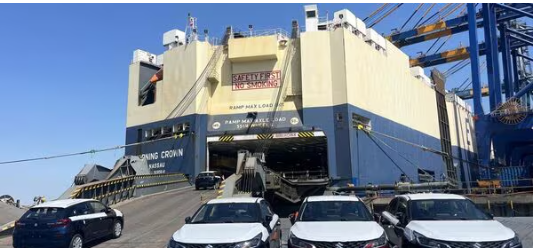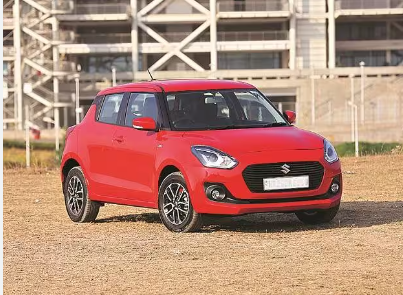Maruti Suzuki’s Vision for 2030 India (MSI), the nation’s largest automobile manufacturer, is not just setting the pace for domestic growth but also charting a path towards substantial global expansion and technological innovation. At the core of this transfor mative vision is the ambition to dramatically increase overseas exports and adopt cutting-edge technologies aimed at reducing carbon emissions. As the global automotive industry shifts towards sustainability, Maruti Suzuki’s Vision for 2030 is positioning itself at the forefront of this revolution, with a robust plan for electric vehicles (EVs), biofuels, hydrogen, and strong hybrid technology.
Aiming for Export Excellence: A Bold Vision for 2030
At the 64th annual session of the Society of Indian Automobile Manufacturers (SIAM), Maruti Suzuki’s Managing Director and CEO, Hisashi Takeuchi, outlined a bold vision for the company’s future export strategy. Emphasizing the importance of India’s role in the global trade arena, Maruti Suzuki’s Vision for 2030 Takeuchi expressed confidence that MSI would witness “multiples of growth” in overseas shipments by 2030.
According to Takeuchi, Maruti Suzuki’s export volumes from India have already tripled over the past four years, and the company is on track to repeat this growth trajectory in the next six years. The automaker’s exports between FY21 and FY24 increased by 1,85,774 units, demonstrating a clear upward trend. What’s even more significant is that MSI is already exporting vehicles back to Japan—an impressive feat that underscores the company’s growing global presence.
In July 2023, the company commenced exporting its sports utility vehicle Fronx to Japan, marking the first time a Maruti Suzuki SUV has been launched in the Japanese market. The first consignment, consisting of over 1,600 vehicles, left for Japan from Gujarat’s Pipavav port. This strategic move not only solidifies Maruti Suzuki’s standing in its parent country’s automotive market but also highlights India’s growing importance as a manufacturing hub for global exports.  For the more information click on this link
For the more information click on this link
A Sustainable Future: Combating Carbon Emissions with Multiple Technologies
Beyond its ambitious export plans, Maruti Suzuki is focusing heavily on sustainability and green technologies. Speaking at the SIAM session, Takeuchi emphasized that the company will leverage all available technologies to combat carbon emissions and reduce oil consumption. From electric and strong hybrid vehicles to biofuels and hydrogen-powered models, Maruti Suzuki’s Vision for 2030 strategy is to offer diverse solutions tailored to the environmental and energy challenges of the future.
One of the company’s flagship projects is the development of high-specification electric vehicles (EVs). These vehicles will feature an impressive range of around 500 kilometers, powered by a 60-kilowatt-hour battery. These models are expected to cater not just to the domestic market but also to international markets like Europe and Japan, signaling the automaker’s intent to make a global impact in the EV space.
Takeuchi highlighted that Maruti Suzuki’s approach goes beyond just launching electric vehicles. The company is determined to create an entire ecosystem for EV users that will address the concerns related to owning and maintaining an electric vehicle. As part of this plan, Maruti Suzuki will build charging infrastructure and offer solutions for resale, repair, and after-sales service. By utilizing its vast dealership and service network, the automaker aims to reassure customers that they will have the necessary support throughout their EV ownership journey.
The Power of Biofuels: India’s Unique Opportunity
One of the most intriguing aspects of Maruti Suzuki’s green strategy is its focus on biofuels. While many countries are already using biofuels to reduce their carbon footprint, Takeuchi believes that India is uniquely positioned to become a global leader in this field. The country is endowed with vast natural resources, including agricultural and animal waste, which can be converted into biofuels with a minimal carbon footprint. In some cases, Maruti Suzuki’s Vision for 2030 biofuels can even be carbon-negative, meaning that they remove more CO2 from the atmosphere than they emit.
Takeuchi’s optimism about biofuels is rooted in India’s abundant supply of raw materials, combined with its large human resource pool. He argued that India need not copy solutions from the rest of the world but could instead develop its own biofuel technologies that are better suited to its unique context. With the right policies and investments, India could quickly become the world’s top producer of biofuels, setting a new standard for sustainable energy in the global automotive industry.  For the more information click on this link
For the more information click on this link
Strengthening Localisation: Reducing Import Dependence
In addition to its environmental ambitions, Maruti Suzuki is also prioritizing deep localisation to minimize dependence on imports of critical components. For a country as large as India, Takeuchi argues, self-reliance in the entire automotive value chain is essential not only for economic security but also for job creation. The manufacturing sector, he noted, has the potential to create large-scale employment opportunities for India’s youth and elevate the country from its current status to a developed nation.
Localisation efforts will also play a key role in Maruti Suzuki’s strategy to make EVs more affordable and accessible to the Indian public. By producing more components domestically, the company can reduce costs and pass those savings on to consumers. In turn, this will make it easier for more Indians to transition to electric vehicles, Maruti Suzuki’s Vision for 2030 helping to reduce the country’s overall carbon footprint.
Maruti Suzuki’s EV Foray: Building a Comprehensive Ecosystem
As Maruti Suzuki gears up to introduce its first battery-powered vehicle in early 2024, the company is leaving no stone unturned in ensuring that its entry into the EV market is a success. According to Partho Banerjee, Senior Executive Officer for Marketing and Sales at MSI, the company is not merely focused on launching an EV; Maruti Suzuki’s Vision for 2030 it aims to establish a complete ecosystem for EV buyers. This includes setting up charging infrastructure, addressing concerns related to vehicle resale, and providing robust after-sales support.
Banerjee emphasized that the company’s approach is holistic, designed to instill confidence in customers who are new to electric vehicles. With its expansive service network, Maruti Suzuki is well-positioned to offer comprehensive support to EV owners, from maintenance and repairs to battery replacements and upgrades. This focus on customer satisfaction and long-term support is central to the automaker’s strategy to make EVs a mainstream choice in India.
The company is also looking at multiple powertrain options to reduce oil consumption and CO2 emissions. In addition to electric vehicles, Maruti Suzuki is investing in strong hybrid technology, which combines the benefits of electric and traditional internal combustion engines. Strong hybrids offer improved fuel efficiency and lower emissions, making them an attractive option for consumers who are not yet ready to fully transition to electric vehicles.
Maruti Suzuki’s Vision for 2030 is also exploring the potential of hydrogen as a clean fuel alternative. Hydrogen-powered vehicles produce zero emissions and offer long driving ranges, making them a promising option for the future of sustainable transportation. While hydrogen technology is still in its early stages, Maruti Suzuki’s commitment to exploring this avenue reflects its long-term vision for a carbon-neutral future.  For the more information click on this link
For the more information click on this link
India’s Role in the Global Automotive Industry
At the heart of Maruti Suzuki’s Vision for 2030strategy is a deep belief in India’s potential to become a global leader in the automotive industry. Takeuchi pointed out that India’s unique combination of natural resources, human capital, and innovative potential makes it ideally suited to lead the world in sustainable automotive technologies. From biofuels to electric vehicles, India has the opportunity to develop solutions that are tailored to its specific needs and challenges, rather than simply adopting technologies from other countries.
In particular, Maruti Suzuki’s Vision for 2030 India’s vast agricultural and animal resources give it a significant advantage in the production of biofuels, which can play a key role in reducing the country’s dependence on fossil fuels. By investing in research and development in this area, India can create a sustainable energy source that not only reduces emissions but also creates new jobs in rural areas.
Conclusion: Maruti Suzuki’s Roadmap for the Future
As Maruti Suzuki looks ahead to 2030, the company is embarking on an ambitious journey that will transform its operations, both in India and globally. With a strong focus on increasing exports, reducing carbon emissions, and embracing new technologies, Maruti Suzuki is positioning itself as a leader in the global automotive industry. The company’s commitment to building a complete ecosystem for EVs, Maruti Suzuki’s Vision for 2030 developing biofuel and hydrogen-powered vehicles, and strengthening localisation efforts reflects a forward-thinking approach that balances economic growth with environmental sustainability.
For India, Maruti Suzuki’s Vision for 2030vision offers a blueprint for how the country can leverage its unique strengths to become a global leader in the automotive sector. By embracing innovation, reducing import dependence, and investing in sustainable technologies, India has the potential to not only meet its own transportation needs but also shape the future of mobility worldwide. As Maruti Suzuki continues to evolve, it is clear that the company’s impact will extend far beyond the vehicles it produces—it will help drive India’s transition to a more sustainable and prosperous fu ALSO READ:- UNorth Korea Sees a Surge of Russian Jets in its Skies: A Geopolitical Shift Unfolding in East Asia 2024





В этой статье представлен занимательный и актуальный контент, который заставит вас задуматься. Мы обсуждаем насущные вопросы и проблемы, а также освещаем истории, которые вдохновляют на действия и изменения. Узнайте, что стоит за событиями нашего времени!
Выяснить больше – https://quick-vyvod-iz-zapoya-1.ru/